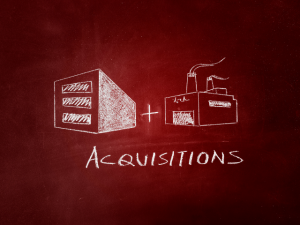By: Mark Zweig
Buying a business – one of the “doorways to entrepreneurship” – is too often not considered by those seeking self-employment.
Most people seem to want to start a new business or buy a franchise – two of the three doorways to entrepreneurship that we discuss in my New Venture Development class at the Sam M. Walton College of Business at the University of Arkansas – but rarely is buying a business (the third doorway) an option.
Over my career, I have bought four businesses that were going concerns. I also bought back a multi-year Inc. 500 company that I founded and we sold to a private equity firm six years after we sold it. I have also been a consultant or adviser involved in hundreds of other transactions – all in the architecture and engineering industry. My experience is much like a home renovation: sometimes it is easier to improve something that already exists versus starting with a clean sheet of paper.
There are great reasons to buy an existing business versus starting one from scratch. Here are 11:
- It can be a faster way to get into it. Starting a new business can have a long lead time. Assembling the right team, becoming known, building your distribution channel, finding a location, and securing your first contracts or sales take time. But when you buy a business that is already operating, you have cash flow from the very first day of ownership. That can save you time and working capital that you would have spent getting things going from a dead start in an all-new business.
- You have a financial history on the business. Having historical numbers is invaluable. It makes planning and budgeting easier and more accurate when you know what your revenues and costs actually are before you get into it versus trying to predict what an entirely new business will be able to produce. Sometimes it is a lot easier when you can see exactly what costs can be cut to make a profit or what products and services sell the best or what areas of the business are the most profitable.
- You have clients and/or customers. You cannot put a price on the value of customers being there from day one. One could argue that this is also true with the right franchise, and I wouldn’t disagree. But start-ups never know for sure if anyone is going to buy what they are selling unless they actually start the businesses. How much is it worth to have an income stream from day one and enough of a good name in the marketplace that the phone keeps ringing and the doors stay open? A great deal. Not only do you have customers – you have people who can tell you what they like and don’t like about the business and its products, services and customer service. That’s all incredibly valuable as you plot future improvements.
- You have a staff of trained employees who know how to do their jobs. It is hard to place a value on an experienced workforce that understands how the business functions from top to bottom. Hiring and training all new employees to do jobs they have never done before in a newly-created business is never easy. Start-ups often underestimate the cost and time that takes. Also, existing employees in the business you’re buying – because of their intimate knowledge – could have ideas on how to make things better that the current owner(s) wouldn’t implement. Listen to them!
- Systems and processes are in place. It can take a long time to figure out how to do everything from making what it sells to accounting for it all. An established business should already have those things figured out. Even if they aren’t doing them the best way possible, they are doing them and that fact may make it easier to figure out how to improve them.
- You should have long-standing supplier relationships that can be extremely valuable. These aren’t always easy to find and you cannot always tell how reliable they will be. A good supplier functions like a partner. They can tell you a lot about what is working and what isn’t. Suppliers and vendors may even be able to help you identify solutions to problem areas that are ripe for improvement.
- You have a location or multiple locations. For some businesses, getting the location is worth the price to buy the business. That doesn’t mean to say the business has to own the real estate, either. Sometimes what is just a leased location is incredibly valuable to the business the business does. And it can’t be procured any other way besides buying the company and taking over the lease or leases.
- You could have goodwill. Some businesses have a lot of it. Locally here in Northwest Arkansas, consider the case of Herman’s Rib House. Long in business and a place that has achieved institutional status, that business has tremendous amount of goodwill. They would really have to perform poorly over an extended period of time to kill this golden egg-laying goose! Customers go every day and will keep going.
- The seller can provide training. Most businesses one could buy have an involved seller whom you can tie down for a certain period of time to help you understand the ins and outs of the enterprise. This training can be helpful and improve your odds of avoiding costly blunders so you can immediately operate the business at a profit.
- You may able to get the seller to finance your purchase, in whole or in part. It has been said of buying a business that “terms are more important than price,” and there’s a lot of truth in that statement. Seller financing means it could take less capital to buy a business than to start one from scratch, and it’s one of the biggest benefits of buying an existing business. There are highly motivated sellers who want to get out – some feel trapped and virtually desperate to get out. They are getting divorced, lost a spouse, have health problems, are burned out and want to do something different with their time, and much more. They want out and there is no one to turn their notice into. This means in some cases they will finance some or all of the purchase price. That is impossible to do with a new business where you need cash to get going and the cash isn’t all going for assets you can use debt financing to acquire.
- It’s lower risk. Because it has goodwill, is operating, has clients and customers, employees, systems, suppliers, and financial history, a location or locations, plus you may be able to get the seller to finance it – buying an existing business is without question inherently less risky than starting one from scratch.
Of course, there are plenty of ways buying an existing business can go wrong. Due diligence is certainly critical. There are plenty of hidden liabilities. Getting the right attorney – one experienced with mergers and acquisitions in your chosen industry – is invaluable. But all of this is the subject of a future article!



